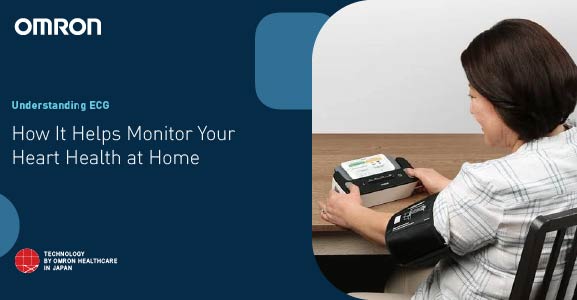Understanding ECG: How It Helps Monitor Your Heart Health at Home
May 14, 2025 2025-05-14 13:13Understanding ECG: How It Helps Monitor Your Heart Health at Home

Understanding ECG: How It Helps Monitor Your Heart Health at Home
Heart health is critical to overall well-being, and keeping track of your heart’s condition is essential for preventing and managing cardiovascular issues. An Electrocardiogram (ECG) is a valuable diagnostic tool that measures the heart’s electrical activity, providing insights into its rhythm and function. With advancements in technology, you no longer need to visit a clinic for an ECG test—you can now monitor your heart from the comfort of your home using a portable ECG machine or an ECG watch.
What is an ECG?
An ECG, also known as an EKG, records the electrical signals generated by the heart as it beats. This test is used to detect a variety of heart conditions, including arrhythmias, heart attacks, and other irregularities. Traditionally conducted in medical facilities, the availability of portable ECG devices has made it easier for individuals to perform an ECG test at home, ensuring timely monitoring and early detection.
How Does an ECG Work?
The heart produces electrical signals that trigger its contractions. These signals can be captured using ECG sensors placed on the skin. A standard ECG machine records these signals as waveforms, which doctors analyze to assess heart health. Modern ECG machines for home use have simplified this process, offering user-friendly interfaces and accurate readings.
Benefits of Monitoring ECG at Home
- Early Detection of Heart Problems
Home-based ECG monitoring allows you to identify abnormalities such as irregular heartbeats or arrhythmias at an early stage. This can be lifesaving, as timely intervention prevents complications.
- Convenience and Comfort
With devices like a portable ECG machine or ECG watch, there’s no need to visit a clinic for routine checks. You can easily perform an ECG test at home, making the process stress-free and accessible.
- Regular Monitoring
For individuals with chronic conditions such as hypertension or a history of cardiac events, frequent ECG monitoring is essential. A portable ECG device ensures you can monitor your heart regularly and share the data with your healthcare provider.
- Data Storage and Sharing
Many modern devices come with storage capabilities, allowing you to track your heart’s activity over time. Some devices also sync with apps for easy data sharing with your doctor, enabling informed decision-making.
Types of Home ECG Devices
- Portable ECG Machines
Compact and user-friendly, these devices are designed for individuals who need reliable heart monitoring. They often include features like digital displays and Bluetooth connectivity.
- ECG Watches
Wearable technology like ECG-enabled smartwatches combines fitness tracking with heart monitoring. These devices are perfect for people who want continuous monitoring without carrying a separate device.
- Handheld ECG Monitors
These lightweight and easy-to-use devices are ideal for spot-checks and provide accurate readings on demand.
How to Use an ECG Device at Home
- Set Up the Device: Ensure the device is charged and functioning properly.
- Attach the Sensors: Position the ECG sensors or device as instructed, whether on the wrist, chest, or fingers.
- Stay Relaxed: Sit in a calm, comfortable position and avoid movement during the test.
- Record the Test: Follow the device’s instructions to start the ECG test. Most devices take only a few seconds to capture data.
- Interpret the Results: Review the readings on the device or app. If you notice irregularities, consult your doctor immediately.
When Should You Consider an ECG Test at Home?
- Persistent Symptoms: If you experience symptoms such as palpitations, dizziness, or chest discomfort, an ECG can help identify potential issues.
- Chronic Conditions: Individuals with hypertension, diabetes, or heart disease can benefit from regular monitoring.
- Post-Surgery Monitoring: After cardiac procedures, at-home ECG tests allow for convenient recovery tracking.
Limitations of Home ECG Monitoring
While portable ECG devices provide valuable insights, they are not a substitute for professional medical evaluations. Always consult a healthcare provider for a detailed analysis and diagnosis. Additionally, ensure your device is validated for accuracy to avoid false readings.
Advancements in ECG Technology
Home-based ECG monitoring has come a long way, with innovations like AI integration and cloud-based data storage enhancing its effectiveness. Features such as real-time alerts, trend analysis, and multi-user support make these devices indispensable tools for proactive heart care.
Conclusion
Monitoring your heart health has never been easier, thanks to advancements in portable ECG machines and ECG watches. Regular ECG tests at home empower individuals to take control of their cardiac health, enabling early detection and better management of heart conditions. While these devices are highly effective, always consult a healthcare professional for comprehensive care.






